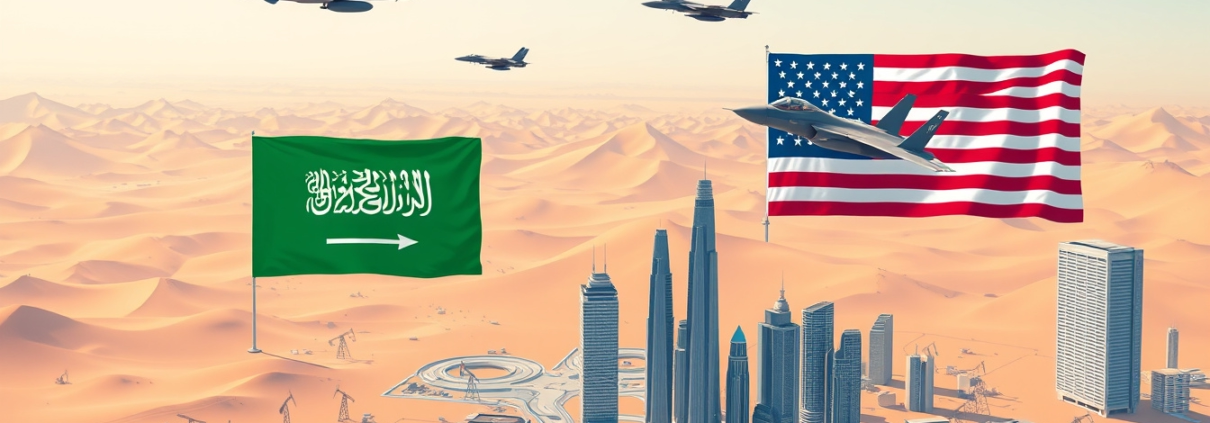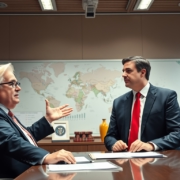Unpacking the U.S.-Saudi Investments and Defense Deals: A $1 Trillion Promise and F-35 Controversies
From $1 Trillion Spending to F-35s: U.S.-Saudi Pledges Are Not Done Deals Yet
Washington, D.C. — U.S. President Donald Trump met with Saudi Arabia’s Crown Prince and Prime Minister Mohammed bin Salman (MBS) in Washington. Trump greeted MBS with warmth. Their meeting mixed defense plans with economic talks. The leaders spoke of a $1 trillion investment and the sale of American F-35 fighter jets. Experts warn these promises do not yet become firm deals.
Landmark Agreements and Investment Pledges
At the meeting, both leaders signed a pact on defense. They met to discuss security and civil nuclear energy. The White House stressed one point: Saudi Arabia promises to raise a $600 billion U.S. investment to $1 trillion. The administration called the change a sign of strong trust and fast progress. No dates or details were given on when the money will flow. Some experts noted that Saudi Arabia produced about $1.07 trillion of goods and services in 2023. This fact makes many ask if the nation can meet such a high figure soon.
Paul Donovan from GBS Global Wealth Management said,
"These pledges come up often on the world stage, even without strict checks. The promise is as large as almost a full year of Saudi output, which makes it hard to trust it soon."
The Controversial F-35 Fighter Jet Sale
The meeting also brought up a possible deal for up to 48 American F-35 stealth jets. A White House note said that President Trump gave a go-ahead for a big defense sale that includes future F-35 deliveries. The plan would keep American defense production busy. Still, the exact jet numbers, delivery dates, and sale terms are not clear.
This planned sale has caused debate. Israel is now the only Middle Eastern country to use the F-35. The long history between Saudi Arabia and Israel adds to the worry. The Israeli Defense Forces fear that Saudi jets could weaken Israel’s air power and change the balance of power in the region.
During one press talk, Trump said, "We’ll be selling F-35s," while praising both nations as strong partners. He added, “I know you might want to see smaller planes, but I believe both should get the best we have.”
Diplomatic and Legislative Hurdles Ahead
Some experts point out that handing over F-35s to Saudi Arabia before Riyadh fixes its ties with Israel may seem early. Bradley Bowman from the Foundation for Defense of Democracies said,
"Washington must fix worries about Riyadh and China. It must follow rules about Israel’s military edge and wait for closer ties between Riyadh and Israel before any jet sale."
Paul Musgrave of Georgetown University Qatar said that naming such deals is one thing. Getting the jets to work in Saudi Arabia is another matter. He warned that problems with technology rules and needed votes in Congress—where lawmakers usually side with Israel—will slow things down.
A Visit Shadowed by Controversy
The trip was the first U.S. visit for Crown Prince Mohammed bin Salman since the 2018 death of journalist Jamal Khashoggi. U.S. intelligence found signs that the crown prince may have approved the act, though Riyadh denies it. This issue made the meeting more complex. Still, both Trump and MBS presented the talks as a step forward for U.S.-Saudi ties.
In summary, headlines now shine on a $1 trillion promise and a plan for F-35 fighters. Yet legal, political, and practical issues mean these deals are still in progress. Many now watch closely to see how these promises work out in the next months and years.
For ongoing updates and expert views on U.S.-Saudi ties and defense plans, stay tuned to CNBC.
Full money-growing playbook here:
youtube.com/@the_money_grower








